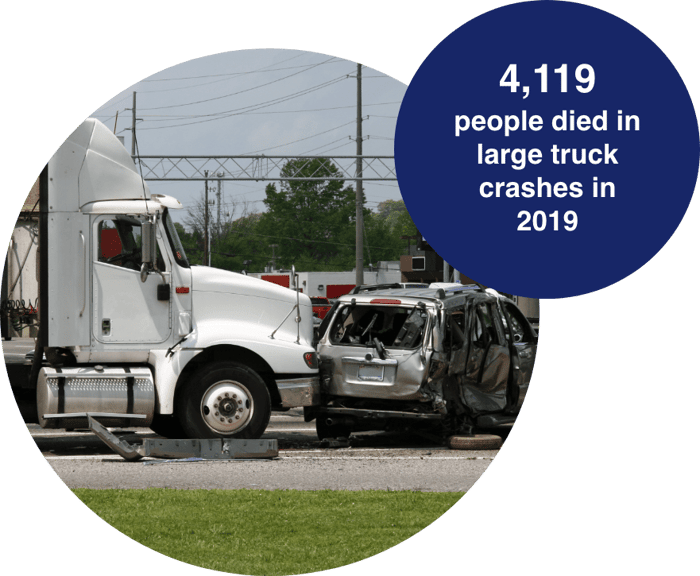Were you or a loved one injured in a truck wreck in Georgia?
Finding a lawyer with the right background is crucial. Our personal injury attorneys specialize in securing maximum compensation for injured truck accident victims and their families.
The city of Atlanta first began as a sleepy railroad town, established to connect the Western & Atlantic Railroad of the State of Georgia. In fact, back in 1837, Atlanta was known as Terminus, due to the settlement’s location along the railroad. While much has changed from then to now, modern-day Atlanta continued to be a thriving hub of transportation, shipping and warehousing—a fact that can be witnessed every day by all of the semi-trucks, 18-wheelers and tractor-trailers on metro Atlanta roads, highways and interstates.
Whether transporting freight from across the country or picking up shipments from Atlanta Hartsfield-Jackson International Airport, one of the busiest airports in the world, commercial semis and large trucks present real risks and dangers to Atlanta motorists. Due to their large size and heavy cargo, tractor-trailer semi-trucks and tankers are like moving buildings that can take out virtually anything in their path— including other commercial vehicles, passenger cars, pedestrians, motorcyclists, and more.
According to the Insurance Institute for Highway Safety, a total of 4,119 people died in large truck crashes in 2019—most of whom (67 percent) were passengers of cars and other vehicles. Pedestrians, bicyclists, and motorcyclists accounted for another 15 percent of fatalities.
What’s more, the rate of truck accident fatalities has only gotten worse in recent years. Despite improved federal trucking regulations, safety technology, and widespread awareness about the dangers of trucking, the number of people killed in truck crashes was 31 percent higher in 2019 than in 2009.
And these statistics only reveal the disturbing trends around truck crash deaths. They don’t account for the tens or even hundreds of thousands of people who are seriously hurt in a collision with a semi or tractor-trailer.
If you or a loved one were seriously injured in a truck accident or your loved one was killed in a fatal crash, you should know that our Georgia personal injury lawyers will help you recover fair compensation for damages such as medical bills, lost wages, pain and suffering, burial expenses, and more.
What type of truck hit you?
Large trucks come in all shapes and sizes, depending on the task it needs to perform. Some of the most common commercial trucks found on Atlanta area roads include:
Tractor-trailers
(semi-trucks, big rigs and 18-wheelers)
Dump trucks
Garbage trucks
(recycling, refuse, grapple trucks, etc.)
Tankers
Flatbeds
Tow trucks
Box trucks
(Uhaul, Penske, moving trucks, delivery trucks, etc.)
Bucket (boom) and crane trucks
Refrigerator trucks
Concrete mixer trucks
Heavy haulers
Log carrier trucks
Common types of truck accidents
Distracted driving
Truck drivers who text behind the wheel are 23.2 times more likely to be involved in an accident, according to the Federal Motor Carrier Safety Association (FMCSA). Truckers face other distractions as well when driving, including drinking or eating, GPS devices, in-cab radio or audio, vehicle controls and distracting events outside of the cab. Long-haul trucking can be monotonous and boring at times, making truckers more susceptible to driver fatigue and being inattentive behind the wheel.
Impaired driving
In Georgia, it is illegal for all motorists to operate a vehicle with a blood alcohol concentration (BAC) of .08 percent. For commercial drivers, this limit is 0.4 percent. Driving while intoxicated or impaired by alcohol or drugs affects a person's reaction time and greatly increases the loss of control and the likelihood of a truck accident. Even prescription medications can pose a risk depending on the side effects and how it interacts with other substances.
Drowsy/fatigued driving
An estimated 13 percent of truck drivers reported being fatigued at the time of a collision, according to the FMCSA. Despite there being federal regulations restricting how many consecutive hours truckers can drive without rest, companies often ignore these safety concerns and push drivers past their limits with strict deadlines and long hauls, potentially leading to fatal accidents.
Bad weather
Poor visibility, slick roads, high winds and other weather conditions can cause a truck driver to lose control of their vehicle, perform improper passing, or fail to see road hazards such as stopped traffic. Trucks weighed down with cargo need more time to stop their vehicle, so to reduce the risk of accidents, truck drivers should reduce their speed or pullover when visibility is limited due to bad weather.
Unsecured loads
If a truck’s cargo load isn’t properly secured, the load can shift during transport or even fall out of the tractor-trailer. This released cargo can wreak havoc on nearby motorists as they attempt to avoid hitting the objects, commonly resulting in multi-vehicle (pile- up) crashes.
Tire blowouts
While driving around Atlanta, you’ve probably seen the remnants of tire blowouts in the form of massive shreds of tire rubber in the median or shoulder of a road. A tire blowout can be dangerous in a couple of ways: 1) the truck driver might lose control of their vehicle and roll over or collide with a nearby vehicle; and 2) the tire rubber can fly up and strike a nearby car or cause them to wreck.
Speeding
Speeding is one of the most common causes of all motor vehicle crashes, but it’s particularly deadly when commercial truck drivers hauling heavy loads make the choice to speed. Vehicles traveling at faster speeds take longer to slow down or stop.
Equipment malfunction
Brake failure is the most commonly cited reason for truck accidents caused by a defective or malfunctioning part. In fact, brake failure is a shockingly common cause of truck accidents, accounting for an estimated 30 percent of truck crashes. However, other equipment and parts can also malfunction and cause accidents, such as steering components, trailer hitch failure, tire blowouts or defective lighting.
How were you injured?
Very few people walk away from the accident scene of a truck accident without needing medical care. If they survive, truck crash victims often suffer serious and catastrophic injuries that have long-term or permanent repercussions. Some of the most common types of injuries include:
- ● Traumatic brain injury (TBI)
- ● Spinal cord injury and paralysis
- ● Internal bleeding, organ damage and other internal injuries
- ● Broken bones
- ● Back and neck injuries (whiplash)
- ● Severe burns
- ● Amputation and disfigurement
- ● Lacerations
- ● Bruises
- ● Post-traumatic stress disorder (PTSD)

Georgia truck accident laws: liability, fault
and deadlines
In addition to the severity of injuries and scale of the damage, one of the many reasons why obtaining compensation for a truck accident can be so complicated is that determining who is “liable” (or at fault) isn’t always so simple. In a typical accident between 2 passenger vehicles, 1 of the drivers is to blame — or perhaps the fault is shared equally between both parties.
However, in a truck wreck, several parties may be involved, making it difficult for accident victims to know who is responsible for paying their damages and how much. Plus, these various individuals and companies may try to shift the blame onto another party and claim no responsibility.
Here are just a few of the possible parties that might be liable for a truck accident:
Truck driver
The driver may bear a large chunk of responsibility for damages if their actions (speeding, falling asleep at the wheel, drinking and driving, texting behind the wheel, etc.) directly led to the wreck. Truck drivers are also responsible for inspecting their rig regularly to ensure it is safe before getting on the road.
Trucking company/carrier
In Georgia, most employers are liable for any harm caused by their full- or part-time employees. It is the trucking company’s duty to hire qualified drivers and properly train them. Carriers that pressure or order drivers to break federal regulations by, for example, driving longer than they are allowed to can be fined and held liable for an accident.
Truck owner
Sometimes, neither the trucking carrier nor the truck driver actually owns the truck; rather, they lease or rent the vehicle from the truck owner. In cases where the truck was insufficiently maintained, the owner may be liable for damages.
Cargo shipping/
loading company
Trucking and transportation companies sometimes partner with cargo shipping and loading companies to help load and unload cargo. If unsecured or improperly balanced cargo was to blame for a truck crash, this company may be to blame as well.
Part manufacturer
Vehicle parts naturally wear down over time, but sometimes a defective part fails too soon or without warning, causing an accident. In such cases, the manufacturer or distributor of the defective part may be liable for any injuries that result.
Another motorist
Truckers aren’t always responsible for an accident. If another passenger vehicle driver is to blame, then truck crash victims may be able to sue them or seek compensation from their insurance company.
Government agency
If poor road conditions (such as a pothole) or construction road work contributed to the truck accident, instead of driver error, then the government agency or contractor responsible for managing the site of the crash might be liable.
Insurance company
While an insurance company is not usually directly liable for a truck accident, they are often one of the many parties involved in a truck injury lawsuit and may
ultimately pay out a settlement claim. Sometimes, multiple insurance carriers may get involved if different insurers represent the truck driver, the carrier, a parts manufacturer or another motorist.
What’s more, Georgia operates under a modified comparative negligence (fault) system when it comes to truck accidents. This means that the responsibility each individual bears for an accident is considered in the final award or verdict. While you can still seek compensation if you were partly at fault for a truck accident, your damages will be reduced by your degree (or percentage) of liability.
To overcome these and other challenges, truck accident victims in Georgia should consult with an experienced trucking accident attorney as soon as possible. Georgia’s statute of limitations for a truck accident lawsuit is typically 2 years from the date of the crash. However, the sooner you seek legal representation, the better your attorney can prepare for building a strong case.
Meet your Georgia truck accident attorney
Julian Lewis Sanders founded The Law Offices of Julian Lewis Sanders and Associates in 2003. The firm proudly serves Atlanta and the surrounding communities of Georgia in personal injury law.
“Growing up in a military family, I learned the importance of dedication and honor early, which established a foundation for my eventual
law career.”
We want to help you. Give us a chance to listen to your needs, answer your questions, and show you how we will take swift strategic action to help right the wrong that has been done to you.
Excellent! Some time ago, my wife found out about Julian Sanders, and she hired their services as our legal representatives in court. They helped us in getting the compensation due to us. I can never thank them enough. –Jastin Clark
Call or text the Law Offices of Julian Sanders & Associates 24 hours a day, 7 days a week:
(678) 705-9581
TRUCK ACCIDENT
At the Law Office of Julian Lewis Sanders & Associates, we understand the tremendous physical, emotional and financial toll a truck accident can take on the lives of victims and their families. In addition to the stacks of medical expenses piling up, you may be worried about paying the bills while being out of work. And then there’s the question of justice — holding those responsible accountable for your losses.
Our Georgia truck accident attorneys have decades of experience and can help you seek a favorable settlement for medical costs, lost wages, pain and suffering, emotional distress and more. We'll start by investigating the details of your crash and identifying all liable parties. Then, we'll calculate your damages (short and long-term) and negotiate for a full and fair settlement - fight for you in court, if it comes to that.


